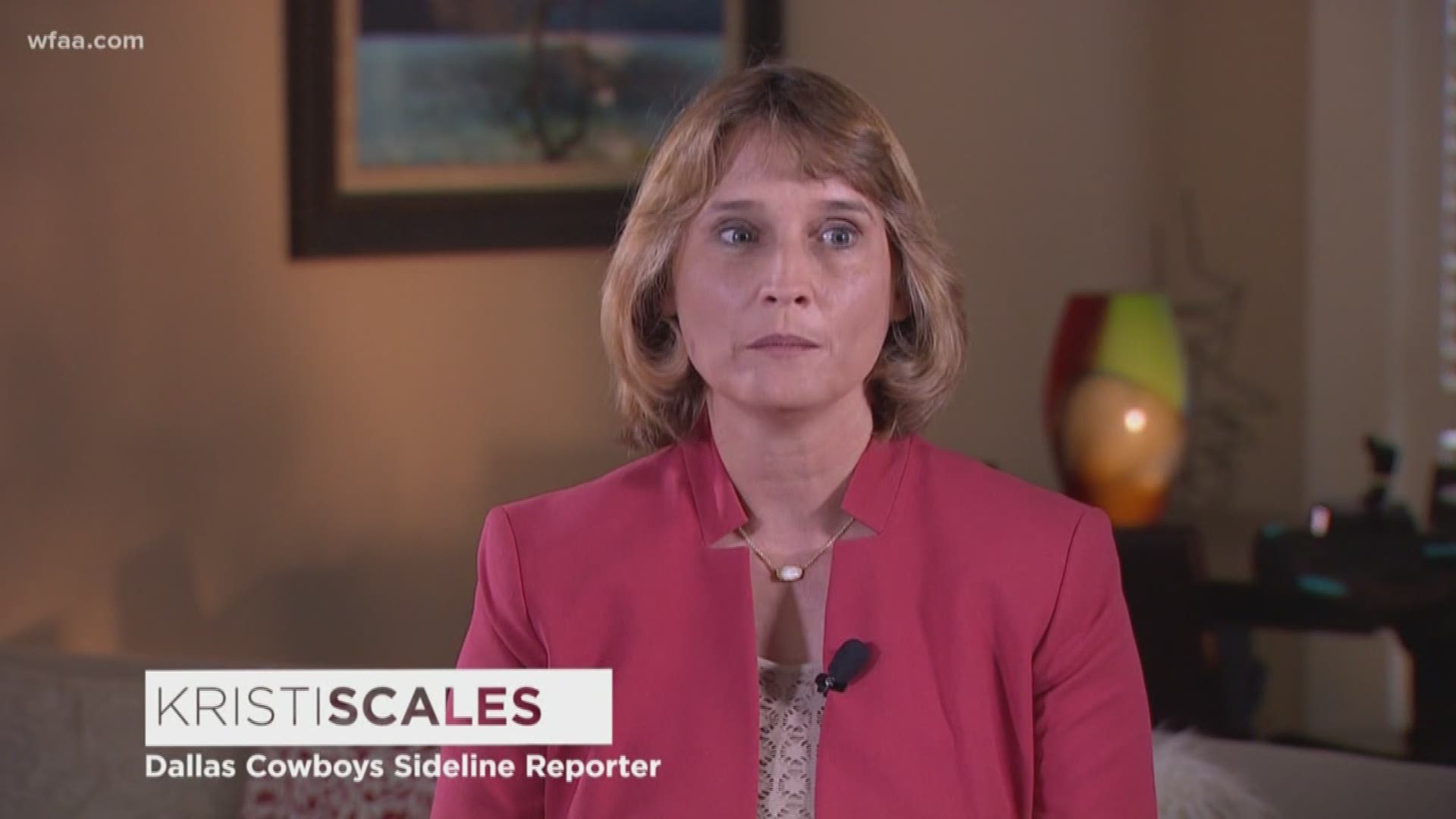Her voice is familiar to a generation of Dallas Cowboys fans, and most of them likely never think twice that she is a woman. Kristi Scales will soon begin her 20th season as the Cowboys’ sideline reporter, but when she first took on the role, she broke down a barrier. She was the first woman to hold that position for any NFL team.
“I was originally hired at KVIL radio by Ron Chapman, the legendary hall of fame DJ and executive producer of Dallas Cowboys radio,” Scales recalled. “When I moved from behind the scenes after eight years as the producer in the booth down to the sideline on air, Ron Chapman told me, ‘This is not fair, but because you’re a female and the only female on the broadcast, you will sound different than anyone else on the broadcast. Your voice will stand out. You have to be better. It’s not fair, but that’s the way it is.’”
Scales continued, “I accepted it. I put in a lot of effort and now, when its gameday, Cowboys fans don’t care if they’re getting the instant information from the sideline from a male or a female. They just want the information.”
Award-winning sportswriter Charean Williams can share similar stories about entering the world of sports journalism when few women were in the industry.
“In 1989, I got left outside the Arkansas locker room. All the men entered the locker room, and I’m standing outside,” she said, about a football game when Arkansas was visiting Texas A&M in College Station. Arkansas would not allow a woman to enter in the locker room.
“They promised to bring the quarterback and the coach out,” she recalled. “But I was still standing there when the male reporters started exiting and they said the players and the coach had gone out the back door, and so I got nothing! We would never see anything like that today. And if we did, it would be a huge controversy people would be talking about it. That’s how things have changed.”
Change was slow for a while. Williams was the first woman to serve as president of the Pro Football Writers of America and the first woman to serve as a selector for the Pro Football Hall of Fame. Her entrance into that club was a little rocky.
“I did know it was historic when I was making the first vote,” she said. “I’ll never forget there was another voter when I went into the first meeting, and he didn’t know.
I was going to be in there. This was an older gentleman. I walk in and he did a double take and said, ‘What is she doing here?’ But, they have accepted me now.”
The NFL estimates that almost half of its fans are women, so rethinking not only the way it markets to women, but also offers them career opportunities makes monetary sense.
The NFL says 33 percent of all front office positions across the NFL are held by women, including 14 who are either principal owners or hold significant ownership stakes. Across the league, more than 100 executives at the vice president level or above are women, including the Dallas Cowboys’ Charlotte Jones Anderson, Executive Vice President and Chief Brand Officer.
The NFL provided additional statistics about women in football operations. The NFL employs:
- Six female athletic trainers
- Two full-time female coaches
- Two officials
- One head team physician
The NFL has also started actively recruiting women. Its Women’s Careers in Football Forums, held in 2017 and 2018, resulted in nine women being placed in intern positions at NFL training camps.
Scales said Sarah Thomas, who became the NFL’s first female referee in 2015, was recently promoted to head linesman, which lead to a change in Thomas’s title.
“In recognition of her gender, the NFL actually changed the name of that officiating position and instead of head linesman, it is now a down judge,” said Scales. “That’s league wide, not just for Sarah.”
“I know it’s just the name of a title, and it’s just semantics, but it’s down judge from now on. A generation from now, no one will ever know it used to be a head linesman.”
Scales and Williams said there were few female role models to pattern themselves after when they were entering sports journalism and broadcasting. They recognize that’s what they are now.
“You want to kind of open the door. Now that you’ve taken that step inside the door, let’s make sure that the door doesn’t close behind you,” Williams said.
“Kristi doesn’t want to be seen as a great female sideline reporter, and I don’t want to be seen as a great female sportswriter. We just want to be seen as really good at what we do because we do a good job, not because we’re women.”
Scales added, “We know we’ll have made good progress when we don’t have to answer the question any more out covering the NFL as a female.”

